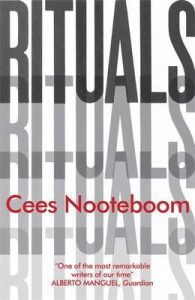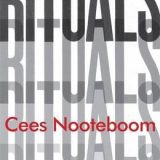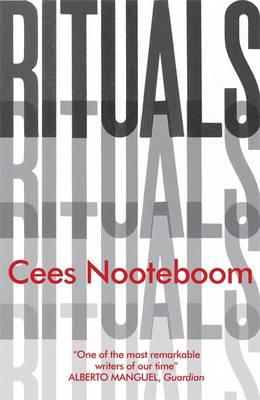Rituals – Cees Nooteboom – 1980
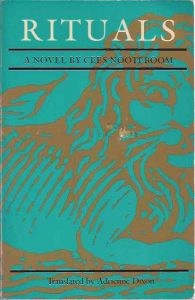
Posted by Lale on 16/12/2004, 10:02:42
As of 16th of December, 2004, there are 7 reviews of this book at amazon.com. All five-star reviews. People have *loved* it. I, on the other hand, didn’t like it at all. I would not recommend it to my enemy. I read all the amazon reviews. I don’t understand how people could have loved it so much. So, I stand alone. It meant nothing to me. There you go, me against the whole world. (Not for the first time, mind you.)
I would be happy to hear your comments (and archive for future generations).
Here are the reviews from amazon. Just look at them: “It is in the top five books of my life”, “it is a solvent in my life”, “It inspired me”, “So rich of ideas”, etc. etc.
~~~~~~~~~~~~~~~~~~~~~~~~~~~~~~~~~~~~~~
Remarkable on all levels, February 2, 2003
Reviewer: Victor Eijkhout (Knoxville, TN USA)
This book gives you something to chew on on every level. The prose is good, (the English translation can not capture some of the idiosyncrasies of Dutch, but is very good overall) right from its opening sentence “The day Inni Wintrop committed suicide, Philips shares stood …” All of the characters in the book are memorable and wonderfully sketched. (As an introverted person, I’m always amused by the walk through the woods scene. Taats asks Inni a question which spurs a two-page train of thought, but he answers only in a mono-syllable.) And it goes up to the structure of the book: the first of the 3 parts is called “Intermezzo”. Plenty of ideas here.
~~~~~~~~~~~~~~~~~~~~~~~~~~~~~~~~~~~~~~
“Confused times were at hand.”, January 15, 2002
Reviewer: G. Merritt (Boulder, CO)
“Read Cees Nooteboom,” a German acquaintance recommended. “You’ll remember his RITUALS.” Nooteboom is a Dutch poet and novelist. Set in Amsterdam during the 1950s, 1960s, and 1970s, his sparse, 145-page novel opens with “the appalling news” of President Kennedy’s assasination (p. 17), and his protagonist, Inni Wintrop’s attempted suicide after his wife, Zita, leaves him for an Italian. The novel then follows Inni as he wanders the streets of Amsterdam alone, looking for meaning in a “wonderful, empty universe” (p. 113). Along the way, he encounters Arnold Taads and his estranged son, Philip, by chance. All three characters have lost their faith in God, and attempt to create their own meaning in life through rituals. Arnold Taads is rigidly tied to time. “Time,” Inni learns, “was the father of all things in Arnold Taad’s life” (p. 46). Philip Taads, on the other hand, attempts to escape time through Zen-like rituals. And as for Inni, “women had become his religion, the center, the essence of everything, the great cartwheel on which the world turned” (p. 60). Intelligent and poetic, RITUALS is ultimately a parable about the importance of learning to ride the inconsistent waves of life in a universe devoid of God.
G. Merritt
~~~~~~~~~~~~~~~~~~~~~~~~~~~~~~~~~~~~~~
Thoughtful meditation on chaos and passion, June 15, 2000
Reviewer: “flavamartino” (Wilmington, NC)
This book is also in my top five books of all time. I did a search under the keyword “rituals” and it did not pop up (I had to find it a backwards way), and I had a moment of profound sadness thinking that this most wonderful book could be out of print. “Rituals” truly does inspire me. I haven’t read it in four years, but it still is one of the best books I’ve ever read. I loved the intoxication of love and the meaning of life search of the main character. What can induce you to get off of the floor and live? I’ve wondered that many times in my life, and Inni (the main character) explores what REALLY matters – if anything. It’s not to say that this book is a dour questing life meaning book – rather it is a rich, bravado, humorous, cleansing book that has many many rewards. The part of this book that I often think about (and I hope this wouldn’t be a spoiler) is the correlation of Inni’s mad, chaotic city (Amsterdam if I remember correctly) with monks in Japan. Very funny and important book. I almost feel akin to all the other reviewers who have read this as if we’re in a special club.
~~~~~~~~~~~~~~~~~~~~~~~~~~~~~~~~~~~~~~
Human Rituals in Godless World, January 24, 2000
Reviewer: Andrew Karbovsky (Almaty, Kazakstan)
This small splendid book is full of ideas. Which is the main one? What is this novel about? A Bildungsroman.An import of human sexuality. An up-to-date evolution of Nietzsche’s concept of “the death of God”. A fate of art in modern society. A trip through time – the fifties, sixties, seventies… Confronted with soullessness of official religion Inni Wintrop, a protagonist of the book, Arnold and Philip Taads, two other main characters of the novel, lost their belief in God, but in cold emptiness and animosity of godless world they created their own rituals. Arnold Taads designed a ritual of strict time regulations of loneliness where even his former lover was not permitted to come in when she had appeared ten minutes before appointed time. Philip Taads turned to Japanese cults “stemmed from a culture and a tradition that were not his and could never become his”. He devised his own East considering the real Japan a spoiled one. They both started with dislike to the milieu which inevitably turned into hatred pointed towards the whole world including themselves. These self-made rituals helped them only in one occassion – to commit suicides in conspicious but rather stagy style. For Inni Wintrop women became his religion. In incessant love-making he lost something very important that makes Love. His sexual promiscuous rituals destroyed his marriage and put him on the verge of death in unsuccessful suicide. The tragic fate of Arnold and Philip Taads, his own meaningless life showed Inni fallaciousness of universal hatred but he still have no answers to the crucial questions of human existence in godless world. I recommend this book to everyone – the beautiful and sad novel of wise Dutch author Cees Nooteboom.
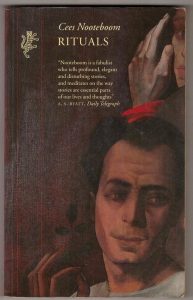
I recommend this to everyone!, December 15, 1999
Reviewer: Kristine Flavino (New York, NY)
I first heard of this book on the happyrobot.net site. This wonderful book starts with a selfish but valid love and ends with understanding of the world. I absolutely count this book in my favorites. I love the imagery, the setting, everything. My very favorite image that I retained is that of the buddhist monk juxtaposed with modern Amsterdam. Sheer beauty.
~~~~~~~~~~~~~~~~~~~~~~~~~~~~~~~~~~~~~~
Spare but so rich in ideas, symbols, July 22, 1999
Reviewer: A reader
I have only recently become a fan of Nooteboom after buying an old copy of his “The Following Story” in an used bookshop. What he does best is to say so much in so few words, and nothing is wasted. This book is full of philosophical musings and observations and merits rereading. Just like his other books. Plus there are some absolutely delectable phrases about modern life.
~~~~~~~~~~~~~~~~~~~~~~~~~~~~~~~~~~~~~~
In the elite top-five books ever, January 30, 1998
Reviewer: slaw235@aol.com (New York)
This book amazes me. It definitly was a solvent on my life. It is a book whose world will accompany me forever. I don’t know why I liked except to say that it connected me to something and was beautiful and funny.
~
Posted by Paul L on 16/12/2004, 11:19:34
I have not read it, but I think I will look for it. It at least warrants a glance.
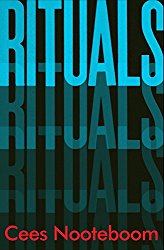
Posted by Guillermo Maynez on 18/12/2004, 9:54:27
Just like Lale, I read the book and did not like it. True, it has some brilliant sentences and true, there are ideas in it (so the author could have written a philosophical essay on the Death of God), but as literature there is nothing to it and I also marvel at the Amazon reviews. “The intoxication of love” says one of them. What love? Everybody, absolutely everybody in this book is totally selfish, devoid of love, adulterer and empty. Now, I am not a religious person, but I have a problem with Existentialism, and that is that if you are an Existentialist the only solution is to kill yourself, as most people do in the novel. Another reviewer points out the unforgettableness of the characters, but I will forget them next week. Inni is a dilettante with nothing to do, who lost his wife for screwing around with other women and never paying any attention to her. So where’s the intoxication of love?. The Taads are completely caricaturesque, not real humans. The son, lost in New Age philosophies, shows that somehow, maybe real, serious religion is preferable to postmodern fads of bad philosophy. He was despicable and pathetic. Life has no meaning and the universe is empty. OK, that has been “discovered” centuries ago, now go and write a good story with something for us to think about. Develop human beings in youor characters, write literature. Didn’t like it.
~
Posted by Lale on 19/12/2004, 10:50:41
Guillermo, I agree one hundred percent with all you have said. I also thought: “Unforgettable characters? What unforgettable characters?”
I thought about what words I use when I like a book? I may say it was beautifully written, I may say “what a great story”, I may say it was funny, interesting, original, pleasurable, entertaining, enriching, thought provoking, sad, different, brilliant, intriguing, page turner … I couldn’t say any of that for Rituals. It gave me nothing.
Luckily, it wasn’t a long book
Lale
